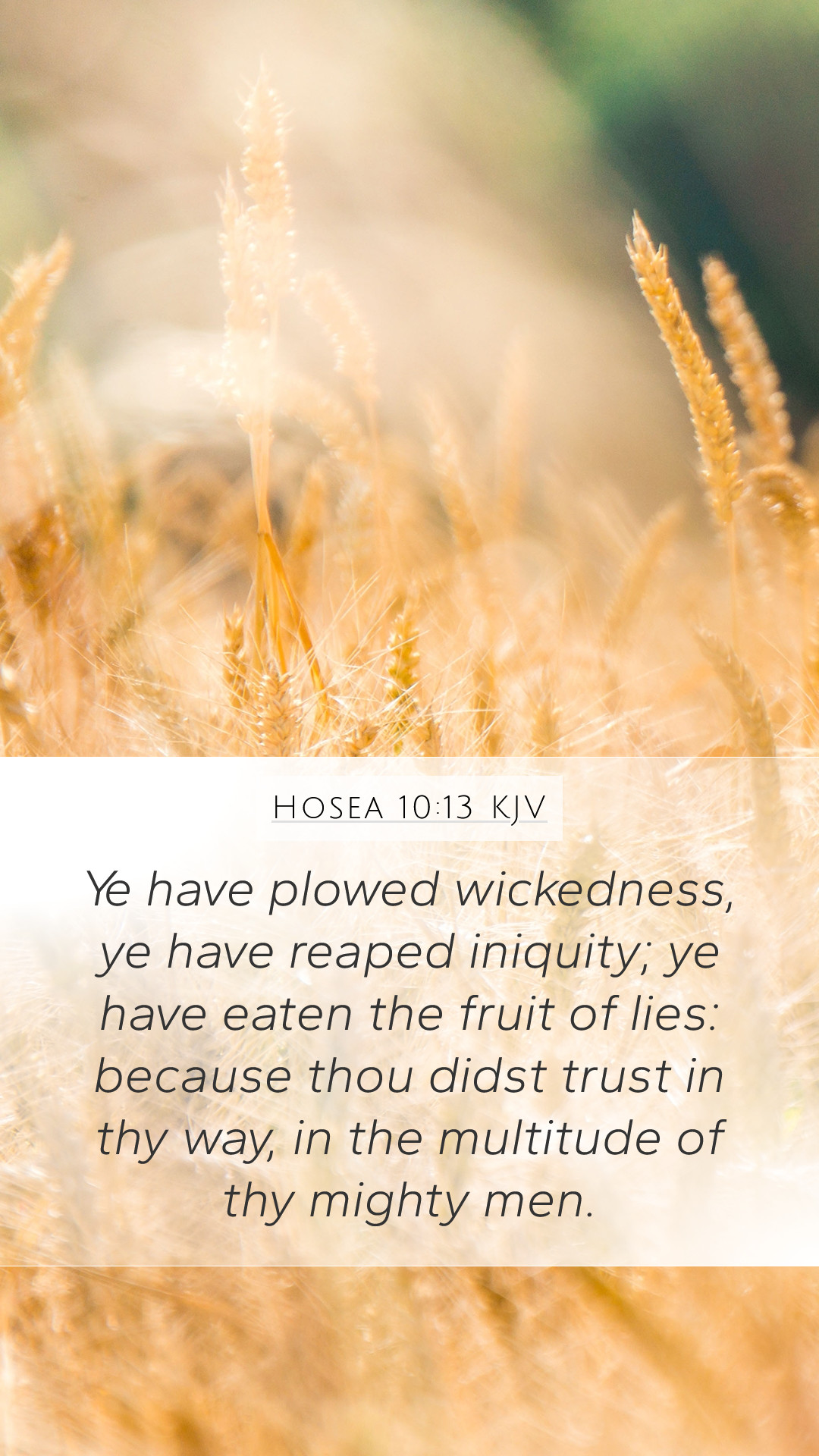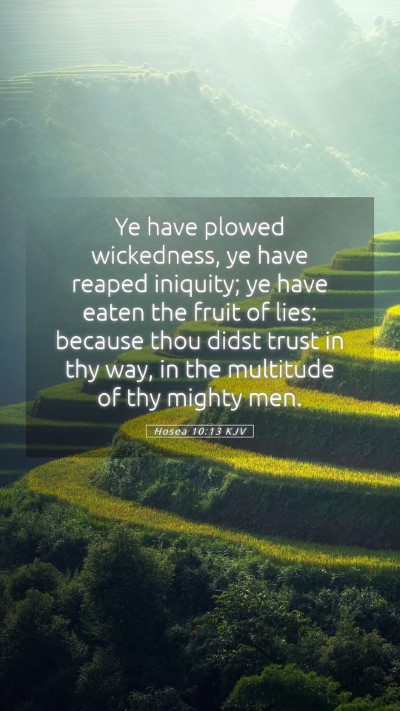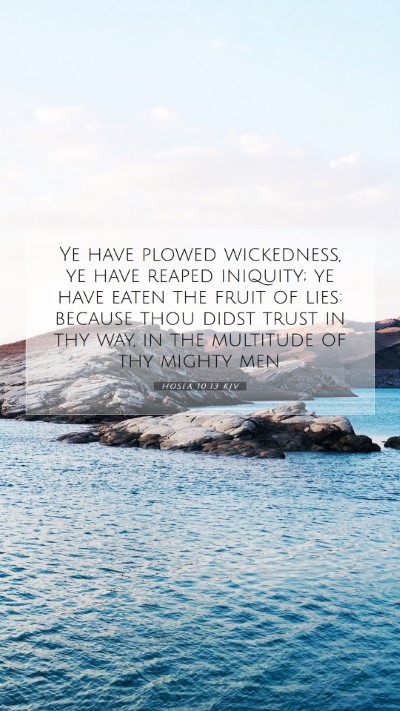Old Testament
Genesis Exodus Leviticus Numbers Deuteronomy Joshua Judges Ruth 1 Samuel 2 Samuel 1 Kings 2 Kings 1 Chronicles 2 Chronicles Ezra Nehemiah Esther Job Psalms Proverbs Ecclesiastes Song of Solomon Isaiah Jeremiah Lamentations Ezekiel Daniel Hosea Joel Amos Obadiah Jonah Micah Nahum Habakkuk Zephaniah Haggai Zechariah MalachiHosea 10:13 Meaning
What is the meaning of Hosea 10:13?
Ye have plowed wickedness, ye have reaped iniquity; ye have eaten the fruit of lies: because thou didst trust in thy way, in the multitude of thy mighty men.
Hosea 10:13 Bible Verse Meaning
Bible Verse Commentary: Hosea 10:13
Understanding Hosea 10:13
This verse states:
"Ye have plowed wickedness, ye have reaped iniquity; ye have eaten the fruit of lies: for thou didst trust in thy way, in the multitude of thy mighty men."
Overview
Hosea 10:13 gives profound insight into the consequences of Israel's actions and trust. The verse is a poignant reminder that the spiritual state of a nation reflects its moral choices. Those who engage in wickedness inevitably cultivate a harvest of iniquity. The dynamics of sowing and reaping are central themes in Scripture, illustrating that moral and spiritual laws govern human behavior just as natural laws govern the physical world.
Interpretation Insights
- Matthew Henry’s Commentary: Hosea observes that the people of Israel have engaged in sinful actions, symbolically “plowing wickedness.” This metaphor suggests preparation for a crop that is not pleasing to God, leading to inevitable consequences. Henry emphasizes the futility of trust in material strength, as the reliance on "the multitude of thy mighty men" points to misplaced trust in military and political power rather than in God.
- Albert Barnes’ Notes: Barnes highlights the spiritual implications of their choices, detailing how Israel’s reliance on falsehood lead to a harvest of deceit and mistrust. He explains that “the fruit of lies” indicates a life built on untruths will yield further corruption. Barnes also stresses the notion that true strength lies in faithfulness to God rather than in human might.
- Adam Clarke’s Commentary: Clarke expands on the idea of plowing and reaping. He explains that the metaphor is indicative of habitual sin leading to judgment. Clarke believes that this verse deserves reflection in our lives; it challenges believers to examine what they are sowing in their hearts and lives. He insists on the bond that exists between iniquity and its just punishments as delineated here.
Broader Themes
The verse encapsulates key themes relevant to understanding Scripture:
- The Law of Sowing and Reaping: This biblical principle, illustrated throughout Scripture, asserts that one's actions directly influence outcomes. A life steeped in sin anticipates a harvest of suffering and destruction.
- Trust Issues: Israel’s confidence was in their own strength and strategies rather than God. This serves as a warning for believers today regarding misplaced trust in worldly power.
- Accountability: The individual and collective consequences of choices lead to spiritual decay or growth. This is a recurring theme in both Old and New Testament teachings.
Application of the Verse
The application of Hosea 10:13 extends beyond its historical context into the lives of modern believers:
- Self-Examination: Believers are encouraged to assess what they are “sowing” in their lives, whether it be righteousness or unrighteousness. Reflecting on one's own actions in relation to this scripture can provide clarity and direction.
- Spiritual Accountability: Just as Israel was held accountable for their actions, individuals today must recognize that spiritual choices come with responsibilities and outcomes.
- Trust in God: In times of uncertainty, placing trust solely in God rather than in external circumstances or human resources is paramount for spiritual stability.
Cross-References
To deepen understanding of Hosea 10:13, the following cross-references provide additional insight:
- Galatians 6:7: “Be not deceived; God is not mocked: for whatsoever a man soweth, that shall he also reap.”
- Proverbs 14:12: “There is a way which seemeth right unto a man, but the end thereof are the ways of death.”
- Jeremiah 4:3: “For thus saith the Lord to the men of Judah and Jerusalem, Break up your fallow ground, and sow not among thorns.”
Conclusion
Hosea 10:13 serves as a stark reminder of the importance of our choices and their implications. By engaging in Bible study and scripture analysis, believers can gain profound Bible verse understanding and apply these principles to daily life. The teachings found in this verse resonate throughout history, calling forth a genuine and reflective approach to living a life that honors God.


